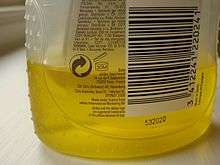Shower gel


Shower gel (also shower cream or body wash) is a specialized liquid product used for cleaning the body during showers. Not to be confused with liquid soaps, shower gels, in fact, do not contain saponified oil. Instead, it uses synthetic detergents derived from either petroleum or plant sources.
Body washes and shower gels holds a lower pH value than the traditional soap, which is also known to feel less drying to the skin. In certain cases, sodium stearate is added to the chemical combination to create a solid version of the shower gel.
History
Shower gel is a derivative invention of the liquid soap, which first appeared in the 1800s. In 1865, William Shepphard patented the formula behind the liquid soap[1], but the product gained eventual popularity with the rise of Palmolive soap in 1898, by B.J. Johnson.[2]
Modern chemistry later enabled the creation of the shower gel, which specialized in cleaning the entire body during baths and showers.
Properties
Shower gels are known to consist of the same basic ingredients as soap - water, betaines, and sodium laureth sulfate, or SLS. But the main difference between the two products lie in its surfactants - compounds known to lower the surface tension between substances, which helps in the emulsification and the washing away of oily dirt. The surfactants of shower gels do not come from saponification, that is by reacting a type of oil or fat with lye. Instead, it uses synthetic detergents for surfactants derived from either plant-based sources or petroleum. This gives the product a lower pH value than soap[3] and might also feel less drying to the skin.[4] Some people have likened the effect to feeling less squeaky clean, however. [5] They are also available in different colours and scents.[6]
Shower gels for men may contain the ingredient menthol, which gives a cooling and stimulating sensation on the skin, and some men's shower gels are also designed specifically for use on hair and body. Shower gels contain milder surfactant bases than shampoos, and some also contain gentle conditioning agents in the formula. This means that shower gels can also double as an effective and perfectly acceptable substitute to shampoo, even if they are not labelled as a hair and body wash. Washing hair with shower gel should give approximately the same result as using a moisturising shampoo.
Marketing
Like shampoo and bubble bath products, many are marketed directly towards children. These often feature scents intended to appeal to children, such as fruit scents, or cookies or cotton candy scents. Many bottles feature popular characters from children's television or movies. As with men's body wash, they often are specifically designed to be used also as a shampoo and conditioner. They also often contain gentle ingredients designed for young skin.
References
- ↑ "On This Day – August 22 : The first patent for liquid soap was issued to William Sheppard on this day in 1865- Learn Chemistry". www.rsc.org. Retrieved 2018-08-01.
- ↑ "The Cleanest Inventions: Soaps and Detergents". ThoughtCo. Retrieved 2018-08-01.
- ↑ Pai, Deanna (November 23, 2016). "Please Help Me Understand Why You Still Use Bar Soap". Glamour. Retrieved July 25, 2018.
- ↑ "Try these 11 expert tips for a better shower; your skin will thank you". NBC News. Retrieved 2018-08-01.
- ↑ "Why you shouldn't *actually* want to be squeaky-clean after a shower". Well+Good. Retrieved 2018-08-01.
- ↑ Guarnieri, Anne-Marie (January 6, 2014). "Bar soap vs. shower gel: A brief look at the history of how we bathe". Fashion. Retrieved July 25, 2018.
Further reading
| Wikimedia Commons has media related to Shower gel. |
- Chang, Katie (April 25, 2017). "Bar Soap Vs. Body Wash". Ask Men. Retrieved July 25, 2018.
- Derbyshire, David (October 12, 2011). "Shower gel better than soap? It just won't wash". Daily Mail Online. Retrieved July 25, 2018.